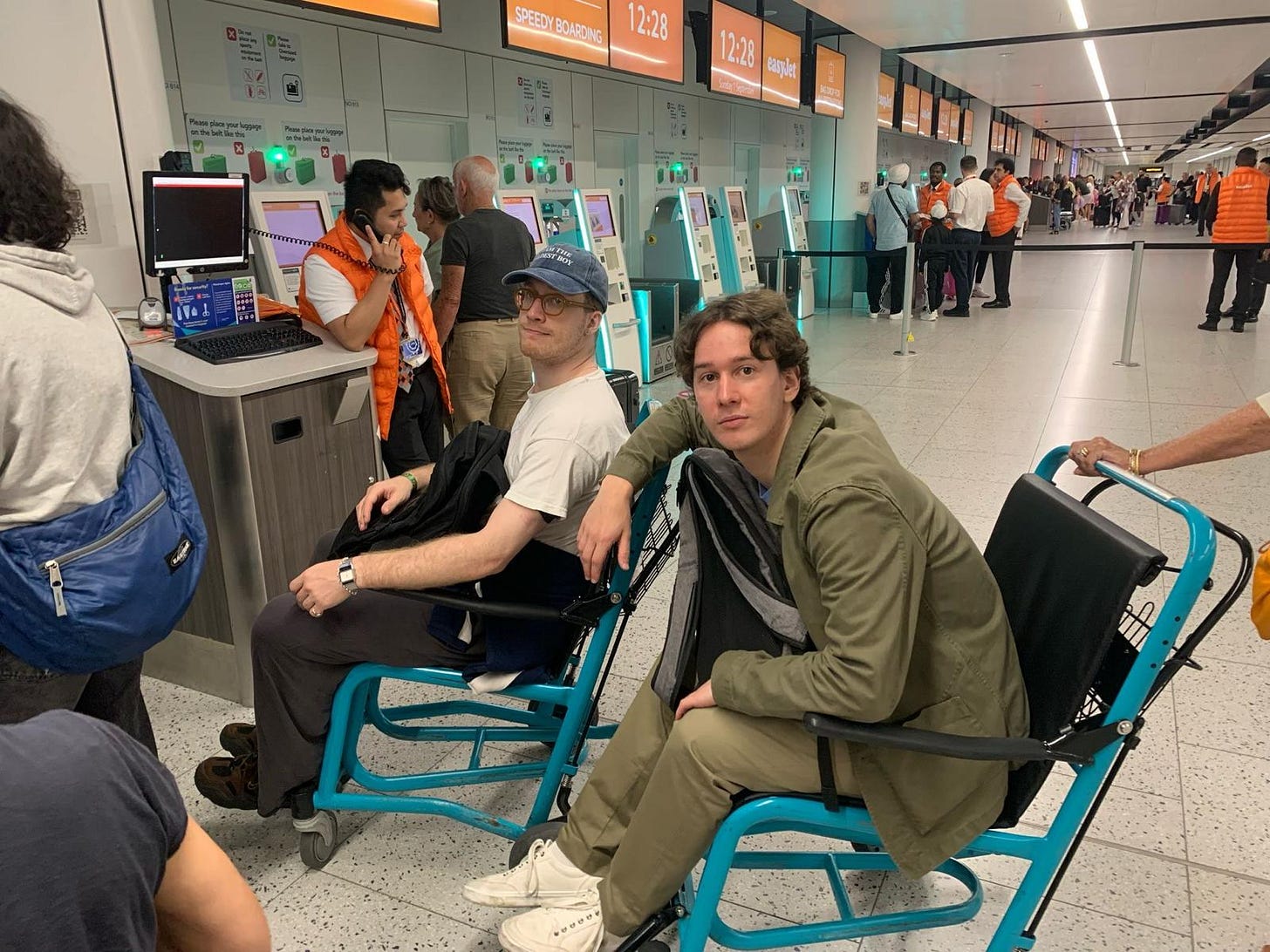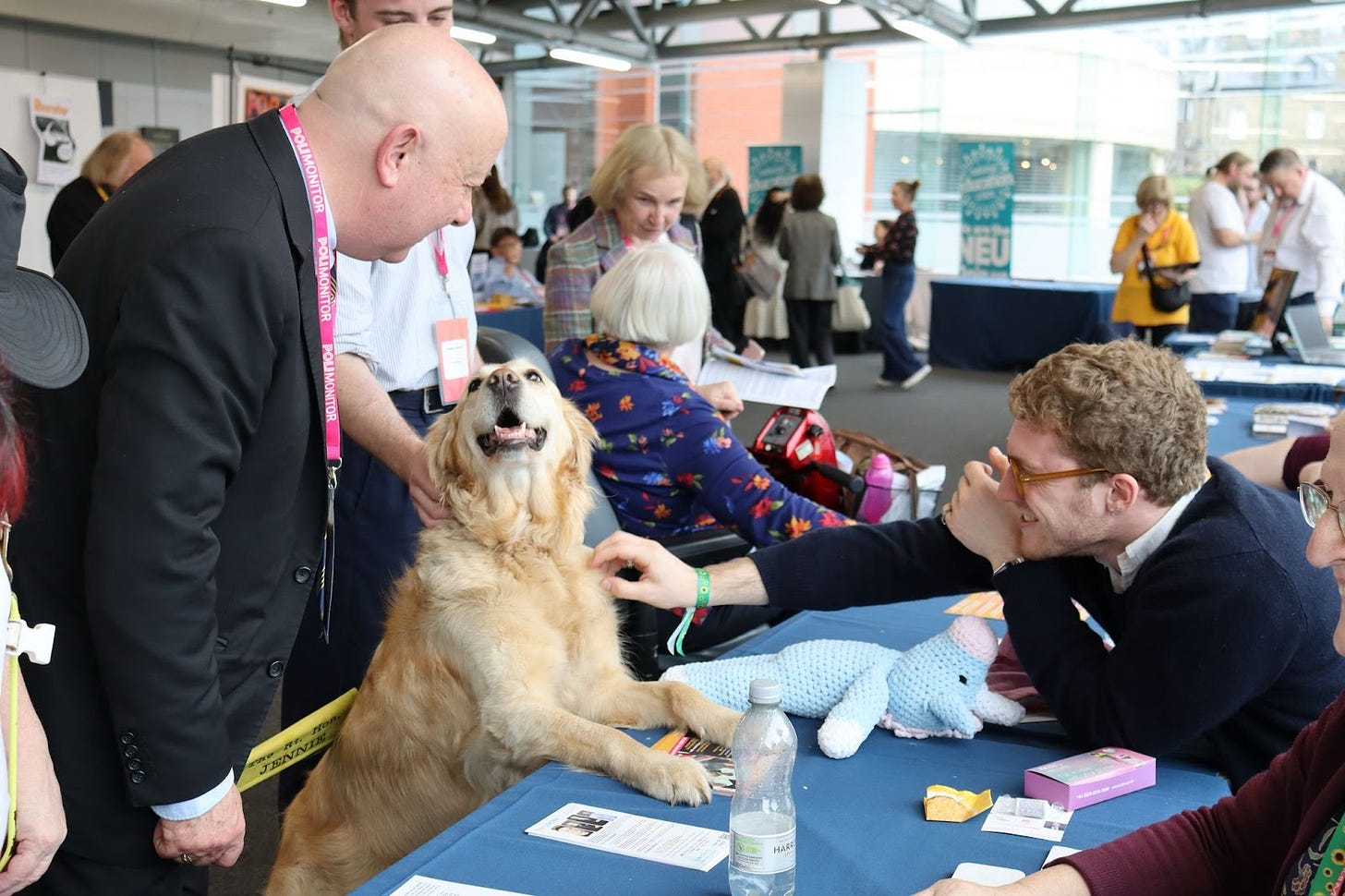ME in the family
A generational Sword of Damocles
Today’s guest post is from Jonah Weisz. Jonah is a public affairs professional and a campaigner for disability rights with #ThereForME and the Liberal Democrat Disability Association. He raises awareness of infection-associated chronic conditions (IACCs) through his personal advocacy and his musical alias Post Viral, which was selected for the Drake Emergent Disabled Artists programme. He first contracted Covid-19 whilst teaching, leading to Long Covid, in 2020.
My Long Covid journey is not just my own. It begins in 1985, 12 years before I was born. A prodigious mathematician in her first year at Oxford University, my mother became suddenly, inexplicably fatigued following a viral infection. After missing months of her second term, her health recovered to the point where she was able to finish the year of university (my mum is awesome). Since then, she has lived a life full of blessings – a career as a curator at the Science Museum, four children, and a degree in fine art at Central St Martin’s – all the time carefully managing her energy levels, often succumbing to seasonal illnesses and periods of greater fatigue.
Then nine years ago, without any one obvious reason, she experienced a dip that has permanently affected her energy levels. As she explained to me, ‘It was extremely challenging, and despite my previous experience of the condition, it profoundly changed my life.’ One might classify her experience as being on the more severe end of ‘moderate ME’ – an oxymoron if ever there was one. She is my hero, and I wouldn’t be writing this today without her love and support.
Long Covid, ME and me
Flash forward to early 2020. I was extremely active, and five months into my TeachFirst training. A mathematics teacher at a state secondary in Highbury, I was regularly working 60–70 hour weeks. The previous summer, I had been the top try-scorer at the 2019 Dublin Union Cup, the International Gay Rugby European tournament.
This all changed on 18th March. Whilst my initial infection was relatively mild, what followed was not. It took me over two years to recover from my symptoms: cognitive and physical fatigue, and relentless neuropathic pain. I was lucky: I was able to identify the symptoms from my mum’s experience (over 50% of Long Covid patients meet the diagnostic criteria for ME), draw upon her years of experience fighting the disease, and acquire a diagnosis (many aren’t so fortunate). Despite this, I had to leave teaching due to my inability to tolerate the cognitive and physical exertion involved.
Teaching and Long Covid
There are hundreds of stories of forgotten front-line workers during the Covid-19 crisis. If you consider how poorly we recognised the efforts of NHS pandemic staff, spare a thought for those of us who also had to travel into work in the middle of the pandemic to provide safe environments for at-risk children.
Once I developed Long Covid, I discovered that the school’s one-person HR team was woefully under-equipped to deal with the challenge of this then-unknown condition. It is a huge conflict for one person to be responsible for both providing support and adjudicating whether you are exaggerating (I, like many others in my position, was ill-equipped to advocate for myself due to lack of knowledge and cognitive impairment).
After I left, I found out that my department’s second-in-command had openly stated that she thought I was faking my symptoms. I had fought every week that year to ensure I didn’t miss a single GCSE lesson for my Year 11s. When they left for exams, I practically collapsed, missing many of the final weeks of my last term of teaching.

In August 2022, having worked desperately to get back into shape, I travelled to Ottawa to compete in the Bingham Cup, the rugby world tournament that my beloved King’s Cross Steelers had never previously won. A magical week followed, in which I kicked the conversion that took us past our arch rivals, the Sydney Convicts, in the semi-final. I battled through so much to lift that trophy, and the memory has been a great source of joy during subsequent recoveries. That was the last time I was well enough to play rugby.
One week later, I tested positive again for Covid-19. Like Sisyphus pushing his boulder up the mountain, I had nearly reached the top, and was about to be crushed as it tumbled back down. The red line on the lateral flow test might as well have been a jail sentence. No leaving the house. No engaging with the activities I loved. No energy. A years-long recovery programme characterised by relentless pain. Almost three years on, I am now pushing that rock up the hill for a third time following another Covid-19 infection in March 2024.
Life beneath the point of a sword
Conveying the experience of ME and Long Covid to non-sufferers is another Sisyphean task. Like being drunk, high or concussed (in fact, very much like being concussed), the neurological impact of IACCs induce a non-ordinary conscious state. You can explain what it’s like to be under the influence of alcohol, but it’s near-impossible to grasp until you’ve experienced it yourself.
Due to the ineffable nature of these conditions, I have found using analogy to be a powerful tool in communicating lived experience. Recently, I have begun to view the generational threat of vulnerability to IACCs as a sword of Damocles. As the tale goes, Damocles is given a taste of power – but must live with a deadly sword suspended above his head, hanging by a single strand of horsehair. Every day I go out in public, share a hug with a flatmate, eat the wrong food or over-exert, I face this invisible, existential threat. So does my mum. So may my children.

After years of Long Covid’s existence and decades of knowledge of ME (dating as far back as 1918, to the post-Spanish influenza epidemic in Tanzania), research now supports the hypothesis that genetic factors play a critical role in determining an individual’s susceptibility to Long Covid. There is also early evidence that ME has a heritable component, with further results due from DecodeME over the coming year.
Clearly, more research is needed. With four out of six of my family now disabled, our once-happy, fulfilled lives have changed forever. I have had to watch one brother’s promising academic career blighted by Long Covid, with postural tachycardia syndrome (PoTS) so severe that he struggles to walk more than 100 metres. Another brother who has battled fatigue for years is awaiting a diagnosis.
Finding purpose: smiling whilst pushing that boulder up the hill
I have found ways to bear this uncertain existence. In Albert Camus’ retelling of the myth of Sisyphus, he imagines the Greek anti-hero pushing his boulder up the hill with a smile.
Contributing to the efforts of Karen, Emma, Oonagh, and many others (Nicky, Jo, Rory, Michael) through #ThereForME has given me purpose. Together, we have achieved more than we had ever hoped: cross-party buy-in from MPs including Adrian Ramsay (Green Party co-leader), Deputy Speaker Caroline Nokes (Conservative), Jo Platt, the leader of the Long Covid and ME All-Party Parliamentary Groups (Labour), Lib Dem Chief Whip Wendy Chamberlain, and Health spokesperson Helen Morgan (Lib Dem).

A personal highlight has been seeing the overwhelming support my party has contributed, both firsthand with the Lib Dem Disability Association, and more broadly with 16 frontbench MPs and 34 parliamentarians in total speaking out in support of patients - it has been a privilege to be a part of some of these conversations.
Likewise, building my own community of disabled musicians has given me life, and I was so proud to have my disco-house act Post Viral selected as one of Drake Musicians’ Emergent Artists.
But all of this has only been possible due to the support of my family. Many are not so lucky. People like us deserve real hope, after decades – and generations – of anguish. Blunt the sword. Facilitate meaningful research. Fund the Plan.





Going through familial ME & LC now. It’s torturous seeing high level autoimmune antibodies suggestive of a connective tissue disease come up in a child affected, and nobody puts the bedfellows together… nobody cares when NICE guidelines have not been followed for years with adults in the family. There’s always been a willful blindness over ME which boggles the mind a bit.
My ME has got worse after covid, my daughter now has POTS from covid and my very fit husband had over a year of long covid. We now mask everywhere in public as each infection piles on more issues. Building networks of other masking people for safer social meet ups